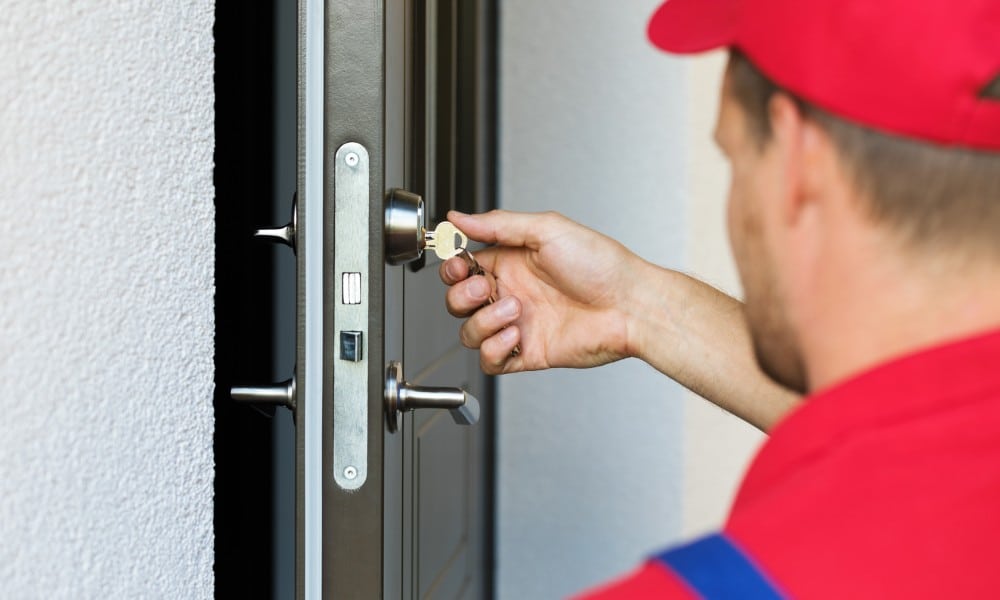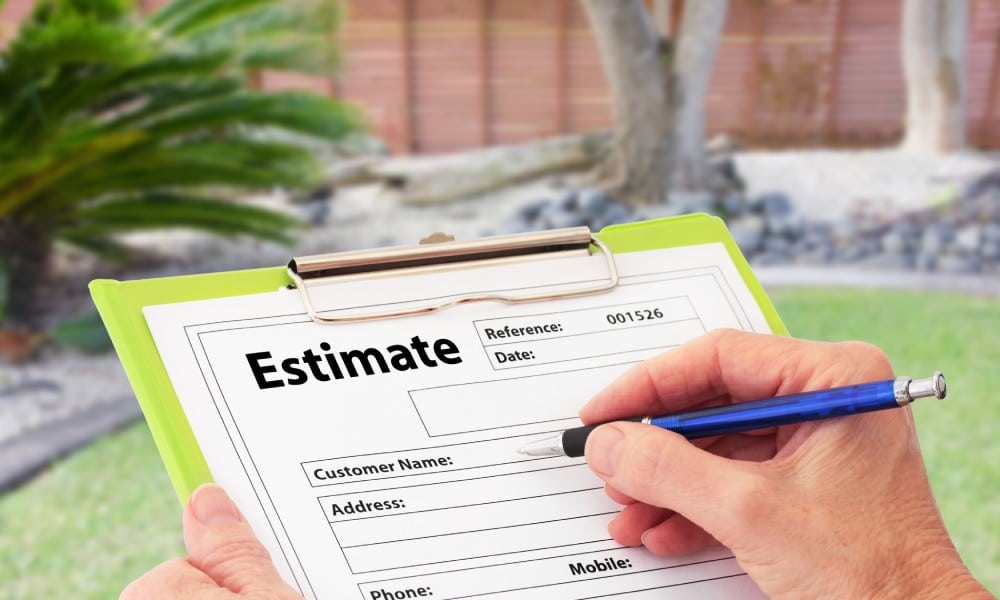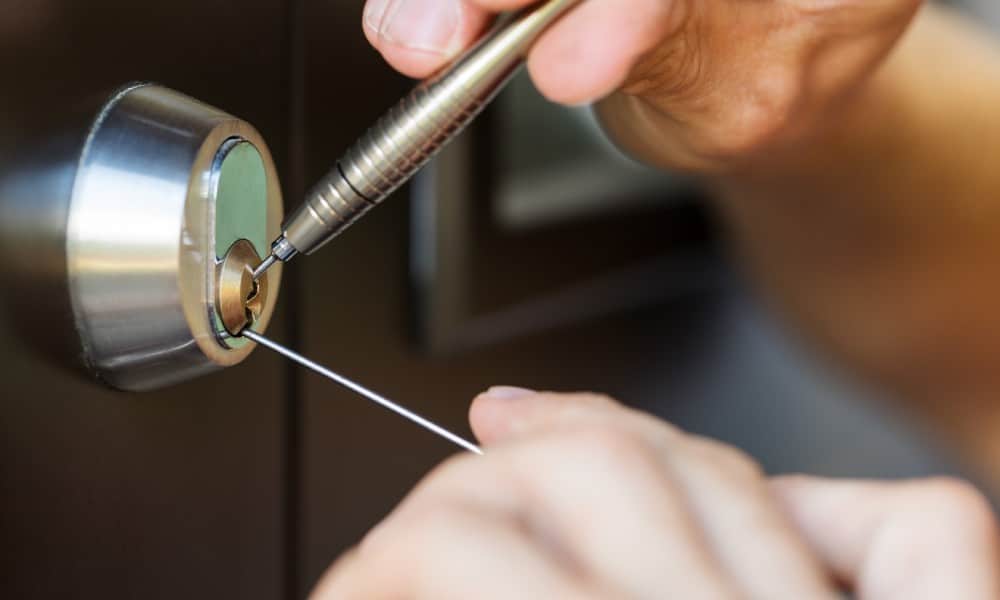
As a homeowner, business owner, or vehicle owner, you may find yourself in need of a locksmith at some point. Unfortunately, not all locksmiths are reputable, and many scammers pose as locksmiths to take advantage of unsuspecting individuals. Fortunately, there are ways to identify and avoid locksmith scams. In this tips & tricks guide, we’ll teach you how to avoid locksmith scams to help you avoid becoming a victim of locksmith fraud.
Signs of a Legitimate Locksmith
Avoiding locksmith scams begins with being able to find and identify reputable locksmiths. This will help you avoid scams completely by selecting reputable locksmiths and help you catch red flags in unreputable locksmiths since you know what to look for. Fortunately, several indicators can help you confidently select a trustworthy, reliable, and skilled professional. Let’s look at some of the signs of a legitimate locksmith.
Verifiable Contact Information
A legitimate locksmith often has a local address and phone number listed, which you can easily verify. Driving by the location listed online or calling the phone number can help you verify that all information is legitimate.
Marked Vehicles
Reputable locksmiths typically operate marked vehicles that clearly display their company name or logo, ensuring transparency. While these marked vehicles are great for advertising, they’re also a layer of protection for you. Additionally, in Portland, Oregon, contractors such as locksmiths must display their CCB (Construction Contractor Board) license number so that customers can verify their license status. Look for this number on marked vehicles as a sign of legitimacy, and be sure to verify the license if you have a concern.
Licensed and Insured
Reputable locksmiths are usually licensed and insured, providing an added layer of security and professionalism. This information should be available on their website, and they should share it when requested.
Detailed Estimate
Before starting any work, a legitimate locksmith will offer a detailed estimate that includes a breakdown of the cost of labor and parts. This breakdown not only ensures transparency but also helps prevent hidden charges.
Verifies Your Identity
Lastly, a genuine locksmith will request to see your identification to confirm that you are the rightful owner or authorized to make changes to the property or vehicle. This is a critical step in protecting both parties involved.
When searching for a locksmith, always look for these indicators of legitimacy. A reputable locksmith will prioritize your safety and satisfaction, making it easy for you to verify these signs.
Common Locksmith Scam Tactics
Now that we’ve examined some signs of reputable locksmiths, let’s look at some common locksmith scam tactics. Recognizing these methods is the first step in protecting yourself against potential fraud.
Lowballing the Price
Scammers may quote an unreasonably low price over the phone to lure customers in. Once the job is complete, they significantly increase the price, citing unexpected complications or additional services.

Insisting on Drilling or Replacement
A skilled locksmith can often unlock a door without damaging the lock. Scammers, however, may claim that your lock is “high-security” and, therefore, not one they can pick, insisting on drilling it out and installing an expensive new lock.

Using Unmarked Vehicles
Legitimate locksmith companies typically use vehicles clearly marked with their logo and contact information. If a locksmith arrives in an unmarked vehicle, consider it a red flag. This can be a sign that the scammer is not a locksmith or does not want to advertise that it is their company working on your lock.
Lack of Professional Tools
Reputable locksmiths carry the appropriate tools for various types of locks. Scammers often use inadequate tools or force to open locks, leading to unnecessary damage and higher costs.
Vague or No Physical Address
Many scam operations use phony local addresses or operate solely through mobile units to avoid detection. Always verify the physical address of a locksmith company and be wary of providers who only list a phone number or P.O. box. Consider the location of the locksmith company as well. Is their address in or near the area they claim to serve, or is it located several states away? A distant address could be a sign of a scam.
Understanding these tactics can help you make informed decisions and select a legitimate locksmith who provides professional, transparent, and fair services.
Tips for Avoiding Scams
It’s crucial to be proactive and conduct thorough research if you want to avoid falling prey to locksmith scams. Start by verifying that the locksmith has a license and insurance, which serve as the first indications of their legitimacy. Then, look for the signs of reputable and scamming locksmiths outlined in this blog. The internet is a valuable resource for checking online reviews and ratings, which can offer insight into the locksmith’s reliability and customer satisfaction levels. These factors will guide you in choosing a trustworthy locksmith and protect you against potential scams.
What To Do If You’ve Been Scammed
If you suspect that you’ve fallen victim to a locksmith scam, it is important to act immediately to protect your property and possibly prevent others from being scammed. Firstly, report the incident to local authorities to ensure there is a record of the fraudulent activity. Secondly, contact your bank or credit card company if you paid for the services to discuss options for disputing the charge. Additionally, consider contacting consumer protection agencies in your area, such as the Better Business Bureau (BBB) or the Federal Trade Commission (FTC), as they may further investigate the matter.
Documenting all interactions and saving any evidence related to the scam, such as receipts, quotes, and communications, can support your case. Lastly, sharing your experience online through reviews and social media can help warn others about the scam and potentially identify repeat offenders.
Conclusion
Locksmith scams can happen to anyone, but by staying informed and following these tips and tricks for how to avoid locksmith scams, you can protect yourself and your property. Remember, vigilance and knowledge are your best defenses against locksmith scams. Watch out for common signs of scams and trust your intuition if something feels wrong. Always prioritize your safety and do not hesitate to report any suspicious activities to the authorities, thereby contributing to combating these fraudulent practices.
For a reputable locksmith in the Portland area, contact Ilan Lock & Key. Our reputable residential lock repair experts will make you feel comfortable and confident throughout the process.
